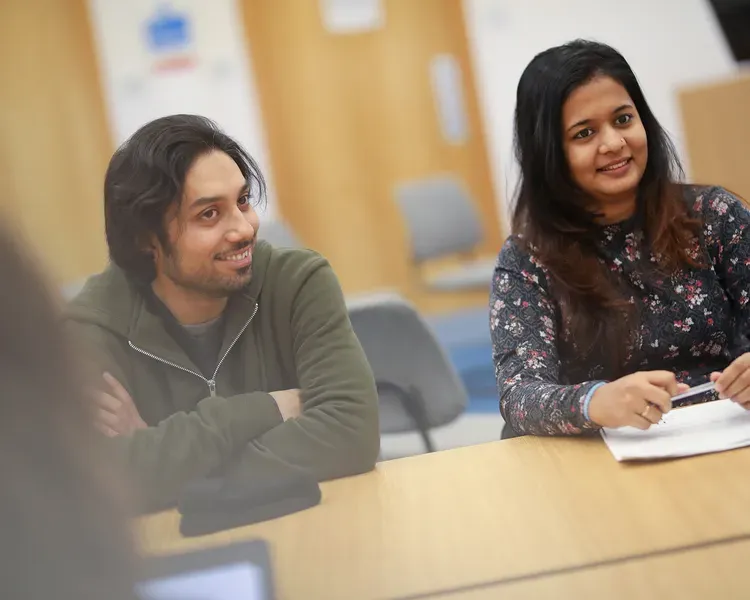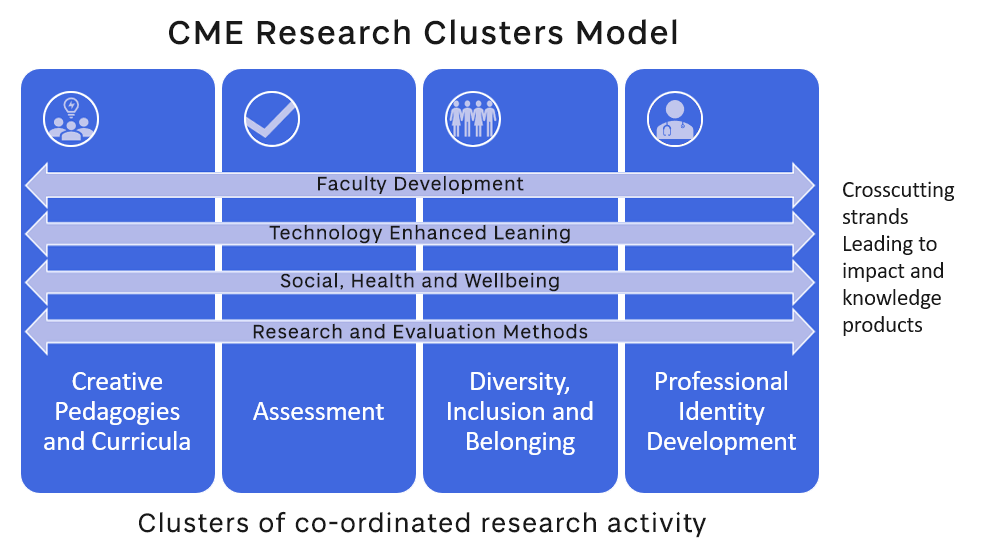Research at the Centre for Medical Education
The Centre of Medical Education (CME) carries out world-class research into Health Professions Education

Organisation of Research within Centre for Medical Education (CME)
Dr Gillian Scanlan is Research Lead for CME.
Our Research Clusters Model
Research and scholarly activity within CME is organised into four broad clusters based on research interests within the team. Each cluster has a lead (or co-leads) and activities are member-led. PhD, Masters and BMSc students are also affiliated to each cluster. Crosscutting the clusters are strands of activity which lead to potential impact and knowledge products (see Figure 1).
Our four clusters of co-ordinated research activity:
- Creative Pedagogies and Curricula
- Assessment
- Diversity, Inclusion and Belonging
- Professional Identity Development
Our crosscutting strands leading to impact and knowledge products:
- Faculty Development
- Technology Enhanced Learning
- Social, Health and Wellbeing
- Research and Evaluation Methods

Creative Pedagogies and Curricula Research Cluster
Lead: Dr Rania Alkhadragy
This research cluster develops research and scholarship relating to pedagogy and curricula. It focuses on responding to current challenges (e.g. decolonising the curriculum, sustainability in the curriculum) as well as drawing on innovative pedagogies to predict and future-proof the curriculum, thereby developing resilience in systems of education.
Areas of expertise within the cluster include:
- Innovative, self-directed and creative pedagogies
- Professional identity development and professionalism
- Faculty Development
- Innovation, integration and adaptation of health professions curricula
- Technology enhanced learning, including use of AI, social media, asynchronous discussion boards, and online safety
Recently published papers include:
- Just pretending: Narratives of professional identity transitions in internal medicine | Medical Education
- Mento’s change model in teaching competency-based medical education | BMC Medical Education
- Learning clinical reasoning skills during the transition from a medical graduate to a junior doctor | The Asia Pacific Scholar
Assessment Cluster
Lead: Dr Majed Wadi
The purpose of the assessment cluster is twofold: 1) to facilitate collaboration on assessment-related research projects and publications that are valuable to us at Dundee and to the wider scientific community; and 2) to create a hub for assessment-related research to reinforce and publicise the research capabilities and interests of our faculty.
Our expertise includes research in the following areas:
- Test design, including authentic assessment, use of AI and novel assessment methods
- The predictive validity of assessment
- Differential attainment / differential awarding
- Entrustable professional activities
- Assessment for selection and widening access
- Workplace based assessment
- Wellbeing and resilience within the scope of assessment
Recently published articles include:
- The framework of Systematic Assessment for Resilience (SAR): development and validation | BMC Medical Education
- Using big data to examine the relationship between candidates’ sociodemographic characteristics and performance in the UK’s Membership of the Royal College of Physicians Part 1 examination | Advances in Health Sciences Education
- Assessment Modalities That Provoke Test Anxiety Among Medical Students | Education in Medicine Journal
Diversity Inclusion and Belonging
Co-Leads: Drs Cate Kennedy and Ben Kumwenda
The Diversity, Inclusion and Belonging (DIB) Research Cluster seeks to share the existing, and identify potential, research projects for development and collaboration. The cluster conveners work closely with students (BMSc, MMEd, PhD), faculty and external collaborators to identify and seek solutions to the wide range of problems related with diversity, inclusion and belonging in healthcare professions – both locally and internationally.
Broad topics of interest include:
- Diversity, inclusion and career progression in clinical and academic medicine
- Representativeness within the curriculum
- Organisational climate within schools of medicine and health sciences
- Cultural barriers to participation in medicine
- Social integration, sense of belongingness and widening participation
- Wellbeing and resilience within the scope of diversity, inclusion, and belonging
- Faculty development
Recently published papers include:
- From corners to community: exploring medical students’ sense of belonging through co-creation in clinical learning | BMC Medical Education
- And Still She Rises: Policies for Improving Women’s Health for a More Equitable Post-Pandemic World | International Journal of Environmental Research & Public Health
- Snakes and ladders: An integrative literature review of refugee doctors’ workforce integration needs | Medical Education
Professional Identity Development Cluster
Lead: Dr Gillian Scanlan
This cluster is a hub for activities around professional identity development (PID) research. It is a supportive working group that helps members develop their own practice as educators as well as develop research projects and ideas with students, peers and colleagues (internal and external). The cluster also acts as a ‘critical friend group’ which shares trusted opinions and advice on research papers and grant applications.
Some of the areas of interest within this group, include:
- Transitions
- Liminality
- Career structures, decisions and pathways
- Interprofessional education
- Dual professional roles
- Leadership
- Organisational structures and their impact on PID
Recently published papers:
- Reclaiming identities: exploring the influence of simulation on refugee doctors’ workforce integration | Advances in Simulation
- Cross-sectional exploration of the impact of the Dr Bawa-Garba case on doctors’ professional behaviours and attitudes towards the regulator | BMJ Open
- Enabling and inhibiting doctors transitions: introducing the social identity resource and belonginess model (SIRB) | Advances in Health Sciences Education
Dundee MedEd Nexus is a series of seminars and workshops hosted by the Centre for Medical Education (CME) and the University of Dundee School of Medicine. It aims to build capacity for healthcare education research across the schools of Medicine, Health Sciences, Dentistry, and Humanities, Social Sciences and Law, by giving colleagues the opportunity to meet fellow education researchers within the University and beyond.
Watch previous presentations now on our CME playlist.
If you have any questions or suggestions for future seminars, please email [email protected].